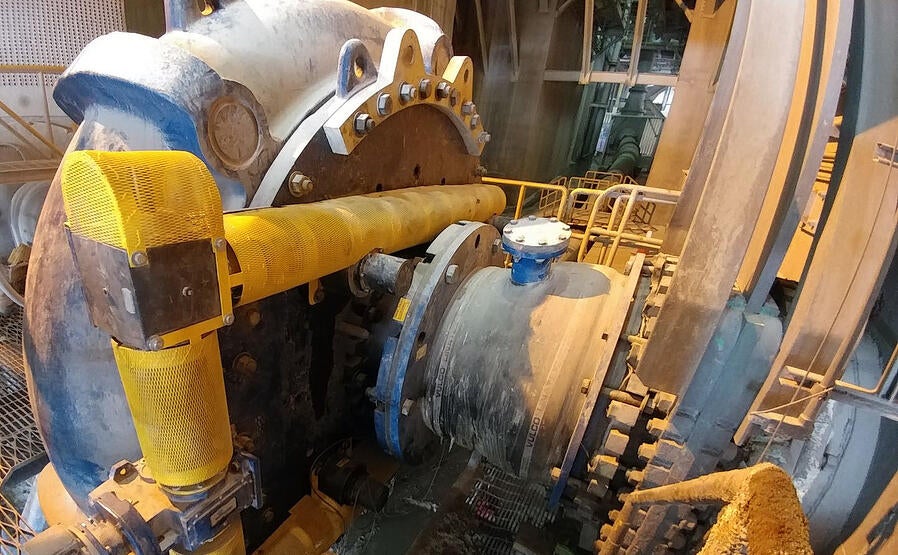
GIW® MDX (Mill Duty eXtra Heavy) pumps are built to withstand the most extreme conditions. The key design features of MDX pumps work together to maximize wear life and maintain throughput for a more productive mill operation. The newest addition to this already impressive family of pumps is the MDX-850, officially the largest pump assembly in the MDX line. And just like its predecessors — the MDX-850 features an adjustable suction liner which can be adjusted remotely or by hand while the pump is in operation.
The nose gap
There are multiple variables that impact a slurry pump’s wear life. One of the simplest ways to improve wear life is to include frequent pump clearance adjustments as part of your regular maintenance and service program. There are three main wear components in a slurry pump: the impeller, the suction liner, and the shell or casing. In the operation of a centrifugal pump, performance is affected by pump clearance, which is the space between rotating and stationary centrifugal pump elements.
The clearance between the impeller suction nose face and the suction liner is commonly called the “nose gap.” Controlling the nose gap is important because of its direct impact on pump internal recirculation and the resulting effects on pump performance and wear rate. Maintaining a small nose gap optimizes pump performance and wear life. Wear of the suction liner and impeller cause the nose gap to widen during normal pump operation. As the gap opens, internal recirculation increases and solids in the slurry further increase the rate of wear.
Regular nose gap adjustment
KSB recommends weekly nose gap adjustment for severe duty applications with extreme wear rates. With proper adjustment, the impeller will be as close as possible to the suction liner without touching it, extending the wear life of each part.
Adjusting the nose gap while the pump is shut down is simple and should be considered routine maintenance. The entire bearing assembly moves via an adjusting screw and nut accessed on the back of the pedestal. Use the adjusting screw to move the assembly forward, back it off to the proper clearance, then tighten. The step-by-step adjustment procedure and minimum nose gap setting varies depending upon pump design, so always refer to your GIW® Slurry Pump Maintenance Manual for details.
The nose gap on pump assemblies that include an adjustable suction liner (ASL) should initially be set with the adjusting screw and nut when new parts are installed. For later adjustments, the ASL is accessible from the suction side and can be utilized while the pump is in operation or stopped. Directions for nose gap adjustments using the ASL can be found in the GIW® Slurry Pump Maintenance Manual. KSB can also be contacted as there are expert, certified KSB field maintenance technicians available to answer questions and assist customers with ASL adjustments.
Remote nose gap adjustment
The key to efficient pump operation in aggressive wear applications is precise weekly maintenance, including adjusting the internal clearance, aka nose gap, between the pump’s impeller and suction liner. These adjustments have traditionally been made by hand, but the GIW® RAMSL (Remotely Adjusted Mechanical Suction Liner) improves this maintenance procedure by allowing for remote monitoring and adjustment of the nose gap. RAMSL makes weekly gap maintenance faster and more accurate.
KSB evaluated multiple options for the RAMSL before deciding to base the design on mechanical components for a more robust product with easy maintenance features and high operational reliability. The RAMSL interface serves as a control panel for operation and the output source for reporting critical data, including vibration readings and precise measurements (i.e., within 0.25 mm) of suction liner position.
The MDX-850 features an improved interface between the suction liner and the suction plate, which allows for the use of a wear ring and innovative hydraulic features at the pump inlet. As with all MDX pump assemblies, the MDX-850 has an adjustable suction liner that is RAMSL compatible.
GIW® SLYSEL & GIW® SLYsight
Deciding which slurry pump is right for your needs can be daunting. To help, KSB offers GIW® SLYSEL, a proprietary software program for selecting the right pump using specific application parameters.
GIW® SLYsight is the next step up in pump wear part analytics. While other systems estimate wear, GIW® SLYsight utilizes custom, strategically placed sensors to measure the actual wear rate of a pump’s parts, as well as the nose gap, while the pump is running. This data is provided in regular reports and available on a convenient dashboard to let customers know exactly which parts need attention and when they require replacement. This enhanced monitoring system adds to a pump’s maximum wear life.

